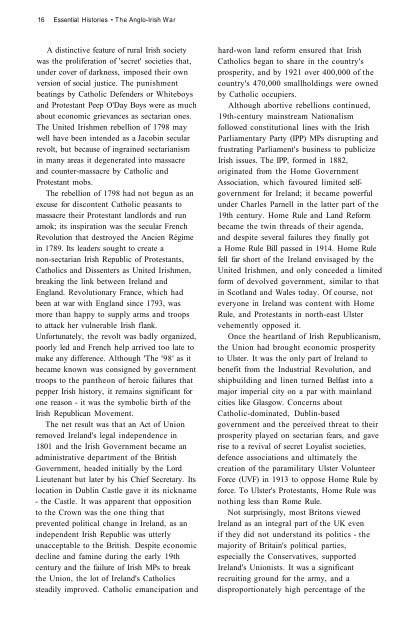You also want an ePaper? Increase the reach of your titles
YUMPU automatically turns print PDFs into web optimized ePapers that Google loves.
16 <strong>Essential</strong> <strong>Histories</strong> • <strong>The</strong> <strong>Anglo</strong>-<strong>Irish</strong> <strong>War</strong><br />
A distinctive feature of rural <strong>Irish</strong> society<br />
was the proliferation of 'secret' societies that,<br />
under cover of darkness, imposed their own<br />
version of social justice. <strong>The</strong> punishment<br />
beatings by Catholic Defenders or Whiteboys<br />
and Protestant Peep O'Day Boys were as much<br />
about economic grievances as sectarian ones.<br />
<strong>The</strong> United <strong>Irish</strong>men rebellion of 1798 may<br />
well have been intended as a Jacobin secular<br />
revolt, but because of ingrained sectarianism<br />
in many areas it degenerated into massacre<br />
and counter-massacre by Catholic and<br />
Protestant mobs.<br />
<strong>The</strong> rebellion of 1798 had not begun as an<br />
excuse for discontent Catholic peasants to<br />
massacre their Protestant landlords and run<br />
amok; its inspiration was the secular French<br />
Revolution that destroyed the Ancien Régime<br />
in 1789. Its leaders sought to create a<br />
non-sectarian <strong>Irish</strong> Republic of Protestants,<br />
Catholics and Dissenters as United <strong>Irish</strong>men,<br />
breaking the link between Ireland and<br />
England. Revolutionary France, which had<br />
been at war with England since 1793, was<br />
more than happy to supply arms and troops<br />
to attack her vulnerable <strong>Irish</strong> flank.<br />
Unfortunately, the revolt was badly organized,<br />
poorly led and French help arrived too late to<br />
make any difference. Although '<strong>The</strong> '98' as it<br />
became known was consigned by government<br />
troops to the pantheon of heroic failures that<br />
pepper <strong>Irish</strong> history, it remains significant for<br />
one reason - it was the symbolic birth of the<br />
<strong>Irish</strong> Republican Movement.<br />
<strong>The</strong> net result was that an Act of Union<br />
removed Ireland's legal independence in<br />
1801 and the <strong>Irish</strong> Government became an<br />
administrative department of the British<br />
Government, headed initially by the Lord<br />
Lieutenant but later by his Chief Secretary. Its<br />
location in Dublin Castle gave it its nickname<br />
- the Castle. It was apparent that opposition<br />
to the Crown was the one thing that<br />
prevented political change in Ireland, as an<br />
independent <strong>Irish</strong> Republic was utterly<br />
unacceptable to the British. Despite economic<br />
decline and famine during the early 19th<br />
century and the failure of <strong>Irish</strong> MPs to break<br />
the Union, the lot of Ireland's Catholics<br />
steadily improved. Catholic emancipation and<br />
hard-won land reform ensured that <strong>Irish</strong><br />
Catholics began to share in the country's<br />
prosperity, and by 1921 over 400,000 of the<br />
country's 470,000 smallholdings were owned<br />
by Catholic occupiers.<br />
Although abortive rebellions continued,<br />
19th-century mainstream Nationalism<br />
followed constitutional lines with the <strong>Irish</strong><br />
Parliamentary Party (IPP) MPs disrupting and<br />
frustrating Parliament's business to publicize<br />
<strong>Irish</strong> issues. <strong>The</strong> IPP, formed in 1882,<br />
originated from the Home Government<br />
Association, which favoured limited selfgovernment<br />
for Ireland; it became powerful<br />
under Charles Parnell in the latter part of the<br />
19th century. Home Rule and Land Reform<br />
became the twin threads of their agenda,<br />
and despite several failures they finally got<br />
a Home Rule Bill passed in 1914. Home Rule<br />
fell far short of the Ireland envisaged by the<br />
United <strong>Irish</strong>men, and only conceded a limited<br />
form of devolved government, similar to that<br />
in Scotland and Wales today. Of course, not<br />
everyone in Ireland was content with Home<br />
Rule, and Protestants in north-east Ulster<br />
vehemently opposed it.<br />
Once the heartland of <strong>Irish</strong> Republicanism,<br />
the Union had brought economic prosperity<br />
to Ulster. It was the only part of Ireland to<br />
benefit from the Industrial Revolution, and<br />
shipbuilding and linen turned Belfast into a<br />
major imperial city on a par with mainland<br />
cities like Glasgow. Concerns about<br />
Catholic-dominated, Dublin-based<br />
government and the perceived threat to their<br />
prosperity played on sectarian fears, and gave<br />
rise to a revival of secret Loyalist societies,<br />
defence associations and ultimately the<br />
creation of the paramilitary Ulster Volunteer<br />
Force (UVF) in <strong>1913</strong> to oppose Home Rule by<br />
force. To Ulster's Protestants, Home Rule was<br />
nothing less than Rome Rule.<br />
Not surprisingly, most Britons viewed<br />
Ireland as an integral part of the UK even<br />
if they did not understand its politics - the<br />
majority of Britain's political parties,<br />
especially the Conservatives, supported<br />
Ireland's Unionists. It was a significant<br />
recruiting ground for the army, and a<br />
disproportionately high percentage of the



